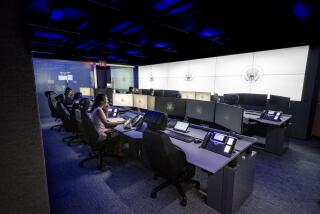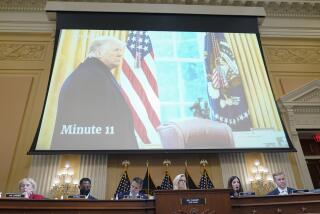Bush Spends First Day of Work at a Fast Pace : Exhorts His Staff on Ethics, Supports Abortion Protesters, Talks to Gorbachev, Other Leaders
WASHINGTON — In a fast-paced first workday in the Oval Office, President Bush exhorted his new staff Monday to avoid “even a perception of conflict of interest,” gave abortion protesters a renewed pledge of support and spoke by telephone with Soviet President Mikhail S. Gorbachev and eight other foreign leaders.
Bush spent most of the day in meetings--at breakfast with Vice President Dan Quayle, at lunch with senior staff members and, in the afternoon, with his Cabinet.
It was a day to touch bases and to send out signals to the senior staff members, who were sworn into office by Quayle with Bush and television cameras looking on, and to Cabinet members, presenting to both groups the first theme of the Bush White House: the need to adhere to ethical standards of conduct in government.
“Nothing dramatic has happened,” said one senior official reviewing the first working day of the new team in the White House. And, he said, the initial day went smoothly.
Speaks to Protesters
At midday, Bush spoke by telephone hookup with 65,000 protesters on the Ellipse behind the White House where they were marking the 16th anniversary on Sunday of the Supreme Court ruling overturning laws that prohibited abortion.
Expressing his “deep personal concern about our American tragedy of abortion-on-demand,” Bush said that the court ruling should be overturned and told the group: “The President hears you now and stands with you in a cause that must be won.”
Until about two years ago, former President Ronald Reagan met with representatives of the anti-abortion groups each year. On Monday, Quayle met with them.
Today, Bush meets with House and Senate leaders to set in motion White House and congressional efforts to trim the budget deficit. But Richard G. Darman, Bush’s choice for director of the Office of Management and Budget, told the Cabinet that discussion of specific budget proposals would not get under way until Bush addresses Congress on budget matters on Feb. 9.
Bush, known for dispatching prompt thank-you notes, lost no time in telephoning foreign leaders whose congratulations had been received over the weekend. White House officials indicated that the short calls--to Gorbachev, British Prime Minister Margaret Thatcher, West German Chancellor Helmut Kohl, Italian Prime Minister Ciriaco De Mita, among others--avoided any detailed foreign policy discussions.
“He expressed the United States’ interest in cooperating with each of the heads of state in the quest for world peace,” the White House said in a written statement. Bush initiated the calls.
Tass, the Soviet press agency, said that Gorbachev told Bush that the President “can be sure” that the Soviet leadership “is prepared to continue looking jointly for ways to improve” U.S.-Soviet relations.
Visit by Son, Grandson
Bush, according to the White House, thanked Gorbachev for the welcome given to his son Jeb and grandson George when they visited Soviet Armenia last month after the devastating earthquake there.
Bush also spoke with Prime Minister Benazir Bhutto of Pakistan, President Raul Alfonsin of Argentina, Prime Minister Rajiv Gandhi of India, President Hosni Mubarak of Egypt and President Mauno Koivisto of Finland.
The White House announced that Bush’s first foreign visitor would be Japanese Prime Minister Noboru Takeshita, on Feb. 2.
“This early visit demonstrates the importance both countries attach to U.S.-Japan relations and underlines their determination to work together to ensure close cooperation on global as well as bilateral issues,” White House Press Secretary Marlin Fitzwater said.
In the Cabinet meeting, according to a White House statement, James A. Baker III, the secretary of state-designate, reviewing U.S.-Soviet relations, said, “we’re much less tense than a decade ago.” But, he added, “realism demands prudence. We must be prudent, cautious and realistic.”
Bush, awake before dawn, began his working day at 7:21 a.m., reporting to the Oval Office six minutes late for his breakfast with Quayle. He then launched into what Fitzwater said would be the routine each morning: a daily intelligence briefing from the CIA, a broader national security briefing from Brent Scowcroft, his assistant for national security affairs, and a conference with White House Chief of Staff John H. Sununu.
Fitzwater said that Quayle would meet with Bush each morning during the sessions with Scowcroft and Sununu, just as Bush met with Reagan during morning national security briefings in the last Administration.
At midday, Bush crossed a private street adjacent to the White House to visit Quayle in the vice presidential office that Bush used in the Old Executive Office Building. There, Quayle signed his name on an 86-year-old desk used at times by nine presidents. Among those who have put their signatures on the desk were the three most recent vice presidents: Bush, Walter F. Mondale and Nelson A. Rockefeller.
And, addressing senior and middle-level White House staff members who were sworn into their posts in the East Room, Bush said: “It’s a question of knowing right from wrong, avoiding conflicts of interests, bending over backwards to see that there’s not even a perception of conflict of interest.”
“I know that we’ll all set a high standard in that regard. We’ve got to try,” he said.
Warning them to expect long days and time away from their families, some of whom filled the room, Bush ordered the group: “Let’s get to work.”
A yellow ribbon, which Kathy Osborne, Reagan’s secretary, had affixed to the front doors of the White House West Wing as a reminder of the Americans believed to be held hostage in Lebanon, was gone Monday and Fitzwater said he did not know who removed it. Fitzwater said that Bush’s interest in obtaining the hostages’ freedom is undiminished.
More than 65,000 gathered for the 16th annual March for Life in Washington. Page 19.
More to Read
Get the L.A. Times Politics newsletter
Deeply reported insights into legislation, politics and policy from Sacramento, Washington and beyond. In your inbox three times per week.
You may occasionally receive promotional content from the Los Angeles Times.










